Three Rings for the Elven-kings under the sky
Seven for the Dwarf-lords in their halls of stone,
Nine for Mortal Men doomed to die,
One for the Dark Lord on his dark throne
In the Land of Mordor where the Shadows lie.
One Ring to rule them all, One Ring to find them,
One Ring to bring them all and in the darkness bind them
In the Land of Mordor where the Shadows lie.
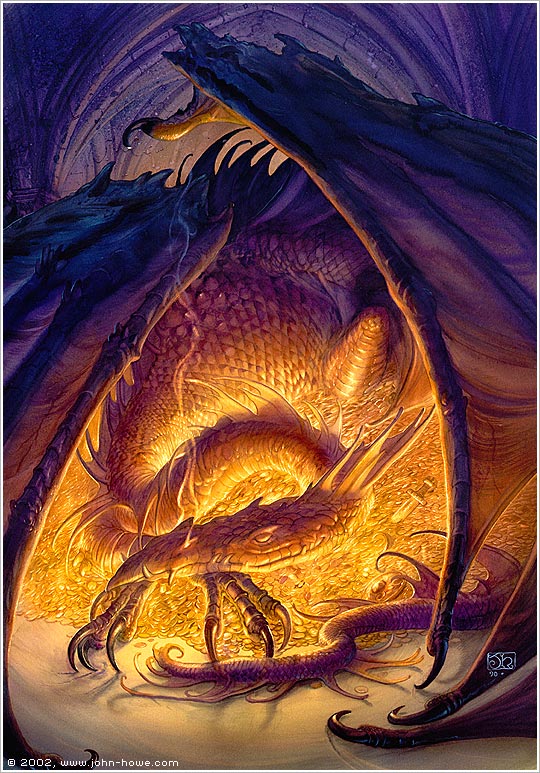
People who don’t play wargames tend to get the spirit of the dice-God wrong. They tend to think our games are built on « chance ». Some of them, called « mathematicians » pretend that on, an even dice, getting a « 1 » is just as easy as getting a « 6 », what a nonsense!
These sad people even pretend that you get any number on a D6 as often as the others. Listening to them you would end up believing that « 1 », « 6 » or any other number is just a matter of rolling the dices once more. Sorry Sir, but this smells like Heresy to me.
Most of the games we play are based on us rolling dices. This has become a part of our lives. I am sorry for you « rational » minded fellows with your simulations, but I know the dices better than you do. I know they are not cold pieces of plastic but dubious primitive spirits (maybe gamers of yore trapped in them by some greater power, who knows?). Sometimes they grant you success beyond hope, sometimes they drag you into a dark pit of fear and despair. All of this has nothing to do with something as silly as probability!
Most of the games I play use mostly a D6 system so I may seem a bit biased to people using a larger variety of dices. I tend nonetheless to think they will get what I mean here.
Nobody cares about « 2 », « 3 » or « 4 »
The numbers on a D6 were not created equal. It may seem like a silly thing to say and it may be a shock for some people but I think it is time to say it out loud: there are some of theses numbers we do not care about.
I don’t remember any of the twos or fours I rolled. I rolled hundreds of them and never cared. Sometimes they were good news (« 4 » on a « 3+ » roll), sometimes bad news (« 2 » on that same roll), but they never were epic rolls. Sorry guys, you are numbers!
« 5 », the Half Blooded Prince
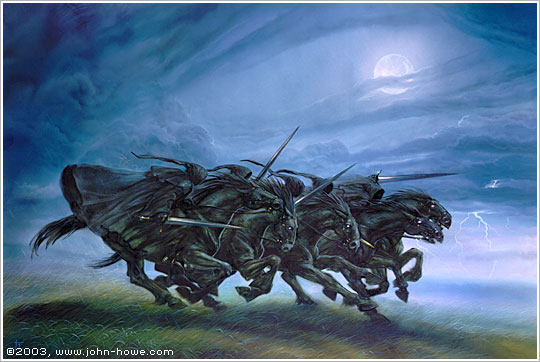
The first number which is not only a number is the bittersweet « 5 ». Its shape itself betrays its hidden power: this reversed & disguised question mark is not a mere number.
Some unbelievers may think that « 5 » is only a « near 6 ». That may be partially true, but to dismiss the power of the « 5 » on that ground would be a dire mistake.
The half blooded Prince is the laughing God incarnation. When it brings you success (which is often the case in a D6 system) it gives you relief (you passed) but also the knowledge that perfection was one step away and is gone forever.
Your opponent is wounded, but you could have killed him had you spotted the weakness in his armour one second earlier. You blocked a dreadful blow with your shield, but had to put all your energy in the parry and never got a chance to counter-attack. Your bullet hit its target, bit did you get a vital organ?
From time to time, eventhough you are acustomed to cheer at the sight of a mighty « 5 », less than perfect is nothing but dust… These times when you need a « 6 » reveal the dubious and dark nature of « 5 ».
You died with the treasure chest in sight. You jumped over the street and your success would have made it into the history books, but you fell, like Neo during his first training. You administered a killing blow, the kind of blow that splits minotaurs’ heads in half, but the damned cow made a side step at the last minute and you only hurt the dirt.
« 5 » is no ordinary number, it feeds on your emotions like a perverse Sith Lord.
« 6 », the Lord of Death

I guess I do not have have to explain much to you fellow wargamers about the sweet « 6 ».
I’ll just drop a word for those sad minded people who believe in probabilities and do not revere the dices: no, the joy I feel when rolling a « 6 » is not the pleasure of being just lucky.
I am happy when I find a bank note (or an abandoned mini – it happened to me once) in the street, but I know I did nothing to get it and that it is pure coincidence. The « 6 » feels far more right. It feels like the combination of skill, training, talent and luck that rewards all great athletes when their move is perfect.
I do not care for your rational minds: rolling a « 6 » does not feel like blind luck, and that’s what I like in games!
A tale of two sixes.
For those of you who never played Confrontation this require some context. Back in the days the wound system in Confrontation was based on a 2D6 roll. The lesser number determined where you wound your opponent (legs, arms, torso, head) and the sum of the results (+ your strength – your opponent resilience) gave you the nature of the wound (from stunned to critical).
Doubles gave you automatic wounds, no matter strength or resilience, and a double « 6 » was…instant death.
I remember one game during which a friend played a monstrously powerful leader: Killyox. All in muscle and teeth he led his pack of wild Wolfen against my griffins.
At one point I decided to sacrifice an executioner to slow the beast down (and get one more firing round before he could crash into my lines and wreck havoc).

My executioner charges the beast. I roll to hit and pass.
Then I roll to wound.
My executioner is in a crouching pose, he can barely make it to his opponent’s knees. I release the dices from my hand and they hit the table. With the dices starting to roll, my executioner start to rise up, slowly at first, then as the dices slow down my executioner takes up speed and start his jump. The dice are stopping on the table as the executioner starts a sweeping move with his two handed blade and then…DOUBLE « 6 »!

The blade sweeps in blinding speed. The giant wolf has no time to react. He cannot smash the little insect dansing in the air in front of him…and looses his balls to the executioner’s blade!
My executioner finishes his jump and lands with perfect balance, his blood tainted blade in hand. Behind him, against all odds, the giant wolf collapses on the ground in a pool of blood…
That is the kind of heroic tales King « 6 » gives you.
I do not remember who won the game in the end, but I remember that roll and I my opponent remembers it too!
« 1 », the Herald of Decay
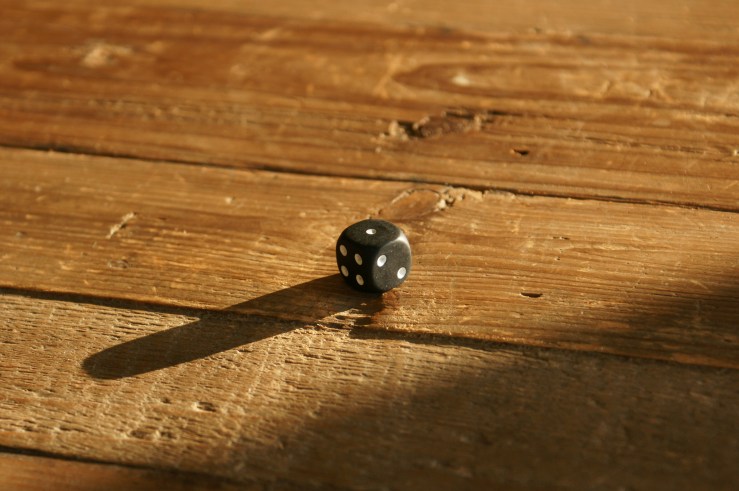
I do not know of one single serious wargamer that will tell me that « 1 » happens as often as any other number. It is just plain wrong to think so. We always get too much « 1 ». That sneeky dark lord is everywhere. He pops out of nowhere at the worst moment, ruining perfect combined attacks, leaving us alone in the dark with only shame and despair. He transforms brilliant offensives and heroic defenses in crushing defeats. He turns heroes into cowards and impregnable fortresses into piles of ruins. He turns the most powerful weapon into a self-destructive device and the mighiest warrior into a feeble shadow of a man.
And on the rare occasion you need a « 1 »? Then it denies you the grace of his dark soul. You do not summon a « 1 », not without perils. His is a malign spirit, he will come, but unannounced and unexpected…
A tale of a bunch of ones.
This one was during a WH40K game. I played the Eldars back then (Ulthwë). My two fellow wargamers were a solitary wolf from Fenris and a black clad Black Templar fanatic. The dices were never good to our Crusader friend and I remember the day they failed him the most.
We were fighting some battle on a remote world and he was really excited because for the first time he got to play some badass Chaplain with all the goodies needed to bring death and despair to the ennemies of the Imperium. He was leading an assault squad in a attempt to counter my own mobility on the battlefield.
In a corner of the table, well entrenched in a wooden hill were my rangers. They were safely away from combat, firing cover shots for my Ost and steadily taking down officiers and heavy weapons bearers one at a time.
As they were adjusting their visors they suddenly heard a terrible roar from the sky…and then the fury of the black marines descended on them. All when very quickly, the black clad warriors landed in the middle of my unit, all was blury motions and furious blows. Dust filled the air. My rangers all went for their combat knifes, but what were knifes good for against power armour?
Leading the marines was the Chaplain. He was in the heart of the melee, as he should, chanting litany to the glory of the Emperor to fortify the resolve of his battle brothers.
I knew the unit to be lost. It was bad news since the assault squad could now go on and maybe make considerable damage in my battle line. The only units I had which could stop them were too far away and engaged in their own struggle. A mistake had been made and I was going to pay for it…
Then my friend rolled to hit and to wound. So many attacks, so many weapons,…close combat specialists against snipers… Then it happened…
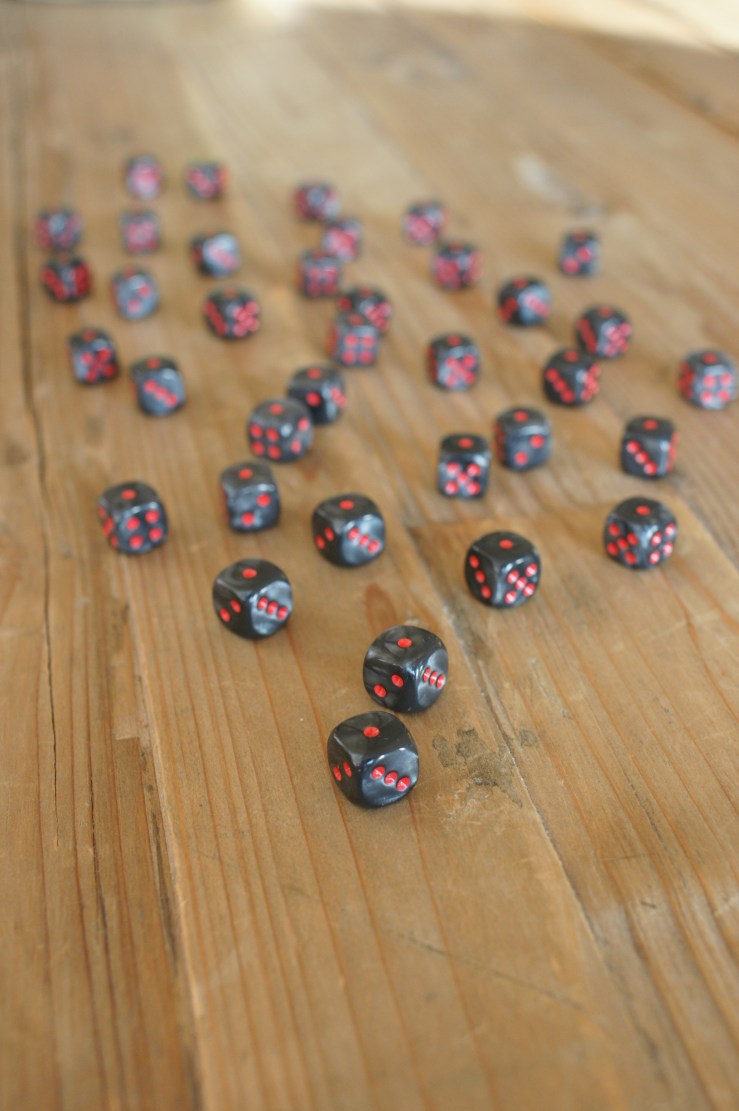
Ones were everywhere. He made some damage, but my unit survived, which was victory in itself. I even had a chance to strike back. Without much faith (but a sparkle of hope) I rolled my attacks. The only wounds I inflected were directed on the Chaplain. My opponent smiled: « armour save » he said with malign eyes. I knew it too well. I was used to play against marines. My Ost was shinning with energetic blades for that purpose only: washing that smile of my Space Marines opponents, but no glowing blue sword were to be seen among my rangers…
He rolled. And then again…

Kaela Mensha Khaine was with me and the Emperor did not hear his Chaplain.
As my ranger jumped on him with blurring speed he was too slow to deliver his blows. In a matter of second the agile Eldar was on his back, using his own jumpback for protection. The Chaplain was confident his ridiculously weak foe could do him no harm, he turned his head and raised his hand, to catch the cat crawling on his back and break his neck.
In doing so he exposed the junction between his helmet and breast plate, on his throat. He exposed it one inch too much, one second too long. The ranger had his long knife in hand. Trained to spot minor flaws in ennemy protection since childhood he saw the weakpoint and dug his blade deep in the Chaplain throat…
The Mon-Keigh was stunned when he felt the cold claws of death clutching his throat. He gargled blood for a minute, refusing to die, then collapsed on himself. My ranger rose on his feet knowing that he had won the day for his people.
My rangers lasted one turn longer than expected and the main asset of my opponent was KIA. I had time to bring reinforcements on that flank and finally won the day, but I knew it had nothing to do with my own skills or luck. I won that day because the Chaplain was praying wrong, he thought the voice in his head was the Emperor’s when it was, in fact, the devious « 1 » that was already planning his demise.
One last thought…
As you may have understood I am not one to complain about the randomness dice rolls bring to our games. On the contrary, as TooFatLardies pointed out in one of their presentation video of Sharp Practice (see here), I think it is one of the most realistic thing in wargames. Chance, luck, random, call it what you want, military history is full of mistakes, pure luck and « against all odds » victories.
I my opinion the dices bring that to our games, they are there to represent the hand of fate messing with a perfectly planned plan. They give us the out of the ordinary: the simple man heroism that saves the day (remember Little Round Top?) or the little mistake that set everything on a very very wrong path (the order was not heard in the confusion, someone who was not supposed to panicked, the men were exhausted,…).
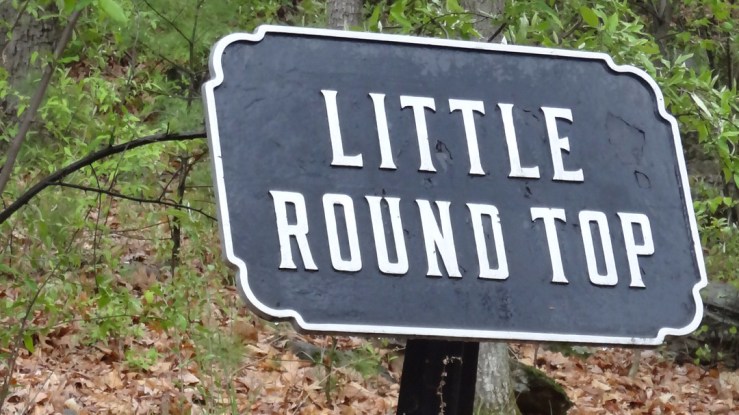
Dices bring the epic and emotions in games that would be otherwise totally predictable and then, from my point of view, quite dull. I like the idea that I can win or lose on one bad roll. I like the idea that I may win not as I planned to, but because events unfolded in an unpredictable, but happy way.
It is of course a matter of balance. I wouldn’t care for wargames where tactics and strategies did not matter and the result of any battle would be pure luck, but the dices give us the chance to win (or loose) against all odds, that’s what I love about them!
Well that’s all for folks. Do not hesitate to tell me what you think about this important topic (here or on twitter).
Pictures by me. No dices were harmed during the shooting of these pictures.
Smaug & the Black Riders are by John Howe (see here).


This was a great post! I really enjoyed it. Cheers Vermenarque!
J’aimeAimé par 1 personne
Thank you very much for reading it!
J’aimeJ’aime
[…] tell stories. Sometimes the mini itself tells the story, sometimes the game is so epic it becomes a story good enough to be told, sometimes it is just anything. Every one of my armies (even the one I use to play) has a story and […]
J’aimeAimé par 1 personne